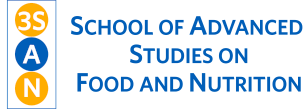Food City Design II Edition
 |
|
Watch the video of presentation of the Master
|
 |
AIMS The 1st Level Master in Food City Design (FCD) aims at forming a manager in food culture, able to keep connections among city municipality, SME, local agricultural food systems, food tourism and citizens, with a peculiar focus on the concepts of food quality and sustainability in terms of production, processing, distribution and any other stage of the food chain that may be relevant for sustainable local food value chains. These managers will be particularly able in the framework of urban regeneration, with a specific competence on food-related issues. The formed figure would work in the public or private sector, including, but not limited to, city municipality, public institutions involved in food procurement, local food production associations, companies involved in food productions and distribution. |
 |
VENUE The FCD master was supposed to be held at the School of Advanced Studies on Food and Nutrition of the University of Parma, in Italy. It has been moved in an online platform due to COVID-19 pandemic. Professors and experts from the Mid Sweden University (Sweden), the University of Alicante (Spain) and the University of Bergen (Norway) will be involved in teaching and training activities. These Universities cooperate with the University of Parma and are all located in cities that are part, together with Parma, of the UNESCO Creative Cities of Gastronomy network. |
 |
 |
The total amount of ECTS provided by this course is 60.
 |
ADMISSIONS Candidates holding at least a 3-years degree, equivalent to what is imparted by a qualified Italian academic institution, can apply for registration to courses. Registration is, however, subject to the evaluation of the title of equivalence by the academic bodies for the sole purpose of registration, as well as the successful completion of an interview with the admission committee, which will be held on December 13th 2021, at 10 am. The interview will be carried out through the Microsoft TEAMS platform and the details will be provided to the applicants before the colloquium date. EU students must submit the Diploma Supplement. NON-EU students, and EU students which do not have the Diploma Supplement, must have their documents translated and legalized and obtain the Declaration of Value from the Italian Diplomatic Representation in the country issuing the qualification. The maximum number of admitted student to the FCD Master is 20.
|
 |
APPLICATIONS Candidates may download the form with all the informations about the master at the following link: https://www.unipr.it/bandi/didattica/food-city-design-master-internazionale-20212022 |
The registration is open from September 6th 2021 to December 6th 2021 at 12.00 (CET)
REGISTRATION:
Once you click on the hyperlink “register on the ESSE3 system“, an Italian-language page will pop-up.
You can easily access to the English-language version by clicking on the top-right button “Menu“.
|
LECTURES info The frontal teaching will be carried out in an intense period (February to benning of June) EXCLUSIVELY ONLINE due to COVID-19 pandemic issues. Microsoft Teams will be used as teaching platform. The lectures are scheduled for 4 days/week for 6/8h (Tue-Wed-Thu-Fri). The lectures could be both pre-recorded (and uploaded at least the day before their schedule) and/or live streaming – based on the lecturer’s discretion. All the materials will be made digitally available off-line. The video recording of the lectures will be available until the scheduled exam. The Master teaching phase will be held in a 16 weeks intensive period during which, the students will:
The Master is designed in 5 short cycles teaching structure. In the end of each short cycle, student’s knowledge will be tested. The learning activities will include the following courses, clustered in the 5 main Areas:
|
AREA |
COURSE |
|---|---|
| The Provenance of Local Food | Agri-food district |
| The Provenance of Local Food |
Industrializing and de-industrializing food |
| The Provenance of Local Food | Local Food Development Strategies |
| Food Tourism and Local Development | The Food Museums: cultural aspects |
| Food Tourism and Local Development | The Food Museums: local development |
| Food Tourism and Local Development | Creative City of Gastronomy: local tourism |
| Food Tourism and Local Development | Cultural and productive evolution of local foods |
| Culture and Creativity as resources for sustainable regional development | The case of Parma Creative City of Gastronomy |
| Culture and Creativity as resources for sustainable regional development | The case of Östersund Creative City of Gastronomy |
| Culture and Creativity as resources for sustainable regional development | The case of Bergen Creative City of Gastronomy |
| Culture and Creativity as resources for sustainable regional development | The case of Denia Creative City of Gastronomy |
| Food Environment |
Ethical purchasing group |
| Food Environment |
The Jämtland-Östersund Foodscape |
| Food Environment | Primary food production and formation of landscape in coastal areas |
| Advancing Wellness and Sustainability |
Nutrition Education & Wellness: educational design and advancing |
| Advancing Wellness and Sustainability |
Case study of craft and local food |
| Advancing Wellness and Sustainability |
Local food plants and the University’s Botanical Garden |
| Advancing Wellness and Sustainability |
Food and education policies |
 |
EXAMS info The exams could be, at lecturer’s discretion: research essay, oral exam, written test, working group activity, mix of the above method. The exam score is 0 to 30 points (at least 18/30 for passing it). The exams are scheduled ideally at the end of the competence area, but the lecturer can define another date. |
 |
PROJECT WORK info The Project Work (stage/project designing/etc.) will be performed between July and November 2022 for 25 CFU – 625 hours (16 weeks circa). At the end, the student needs to write a final report (min 10 max 20 pages) and to prepare a presentation. The work will be displayed as a presentation (20 min + discussion) during the final WORKSHOP. The structure and organization of each Work Project will depend on pandemic situation. The students will then carry out, individually or in small groups depending on the activity, a project work. This activity will be carried out under the direct supervision of one of the professors and lecturers involved in the frontal teaching. These project works will be directly related to the contents learned during the months of frontal lections and will generate a final report and presentation, that will be held in Parma in the early December 2022, where the title will be conferred. The final presentation of each candidate will be carried out during an event organized by the University of Parma, at the presence of many authorities, academics, and companies interested in the field, representing therefore a spectacular opportunity to showcase one’s work and communication skills.
FINAL WORKSHOP (IN PARMA) The final workshop will be ideally in Parma in December; the program will be: day 1 and day 2: final exam (Work Project presentations) |
|
COSTS The FCD Master is FREE of charge for the 20 students that will be admitted, thanks to the contribution of the Emilia Romagna Region, granted to the School of Advanced Studies on Food and Nutrition after a competitive call. |
Practical information:
All requests for information on the FCD Master should be addressed to:






